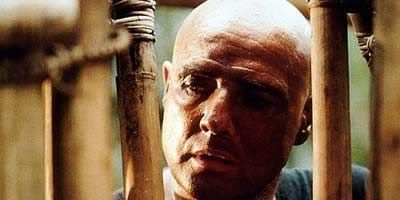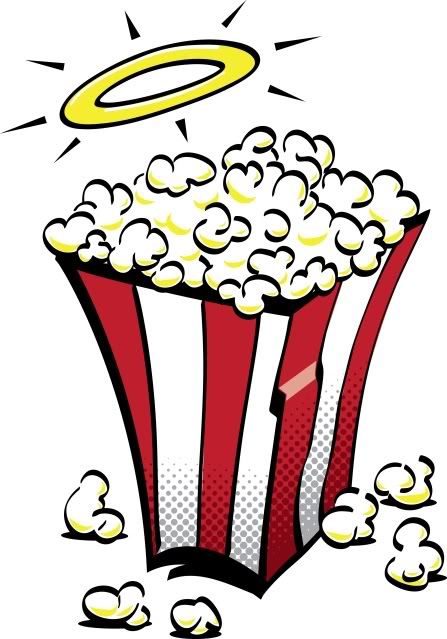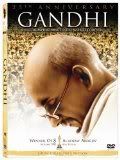
June 2, 2009
Gandhi (1982)
There are times when it appears an actor is born to play a specific role. If this were true, Ben Kingsley work portraying Mohandas Karamchand Gandhi would be the best example. Kingsley gives one of the great screen performances as the meek peace loving icon. The film is worth viewing just for Kingsley command performance. He humanizes the icon in a kind, promotional fashion that supports the legend more than the man. Now granted, Gandhi was a man who did great things with his life, but he was also a very flawed individual capable of some rather odd behavior (his disturbing sexual proclivities are one for starters.) This film wasn’t meant to show the real man but to lionize a fallen leader. Kingsley presents the legend with great conviction to where his performance solidified the man’s iconic status in the Western mind.
Director Richard Attenborough has crafted a patient, sprawling look at Gandhi’s life. There are a number of points where the story lags but these dips are short lived and the film as a whole is worthy of the praise that has been heaped upon it. It is a fascinating film to watch simply out of its masterful construction. Other than a few dry spots and the heavy “Gandhi as living saint” agenda, there is little I can find to criticize in this film. It is simply good cinema. It has a compelling lead, an engaging story and a writer and a director work perfectly in tandem – if only more films had so much going for them.
The one thing that has always stuck in my craw with Gandhi’s beliefs is that he promotes non-violence as a tool to shame the powerful into acting humanely. Gandhi confronted the British Empire, a society built on social order and appearances. Gandhi’s non-violence stance assumes the aggressor has a conscious. Would he done so well against Nazis, or Islamofascists? Believe it or not, there are belief systems out there that promote amorality and people committed to those ideologies are capable of inhuman brutality. It seems to me that Gandhi’s philosophy was so successful because he was dealing with civilized men, not true barbarians.
This is a brilliant film that is something you should at least try to sit through at least once. Those who have short attention spans or aren’t big on sprawling biopics, you may not make it all the way through. The more patient audience will find one of the better films ever made. Just remember that you’re watching an agenda piece more than a true biography.
Related Reviews:
Biopics
Patton (1970)
Milk (2008)
Other Critic’s Reviews:
Roger Ebert
Classic Film Guide
Labels: Ben Kingsley, biography, Candice Bergen, film, John Gielgud, Martin Sheen, movie review
Share
January 24, 2008
Apocalypse Now (1979)
Should I see it?
Yes.
Yes.
Short Review: Incoherent ramblings were never so interesting
This is the greatest bad movies of all time. It is a distracted, unkempt heap. Director Francis Ford Coppola's epic ode to Vietnam is one of the grand shams of world cinema. The script by Coppola (The Godfather) and John Milius (Clear and Present Danger) is a ludicrous string of haphazard scenes that lead nowhere. By the time the wandering narrative stumbles into the final act, the film has descended into an incoherent rant.
I mean every word I’ve written. This is a bad movie. On the other hand I also love this movie.
Honestly looking at this film, one has to admit that it is indeed a horrible wreck. It lacks a basic structure and it suffers from numerous flaws. The film also offers some of the most striking moments from its generation of American cinema and is one of the rare moments where the parts are greater than the whole.
For the uninitiated, Coppola’s view of Vietnam is widely considered to be one of the greatest war movies. It is a reworking of Joseph Conrad’s Heart of Darkness takes place in Vietnam. Captain Benjamin Willard (Martin Sheen) is assigned to assassinate Colonel Kurtz (Marlon Brando) who has gone insane and is waging his own war in Cambodia. Willard takes a U.S. Navy boat up the winding river to Kurtz’s last known location. Following Willard on his trip we experience the violent and surreal world of Vietnam. The film became famous not only for its stark expression of war but also for the legendary behind-the-scenes mishaps. From Sheen’s heart attack to Coppola’s near mental breakdown, the making of the film is often more interesting than the piece it produced (for more on this I suggest watching Hearts of Darkness: A Filmmaker's Apocalypse which is a chronicle of the film’s creation).
Willard’s Homeric journey is handled in episodic fashion with each of his stops on the river being a separate piece of the collective whole. This leads to a mixed bag of scenes where some work and others simply fall flat. This disjointed storytelling saps the coherency from the piece but adds an element of uncertainty which works to enhance the chaotic hell Willard finds himself in. When this approach works it works brilliantly and makes the film worth every second. The problems settle in when the film has to resolve itself.
The final act when Willard confronts Kurtz is a ridiculous piece of film making. Marlon Brando in all of his bloated, mumbling glory is a laughable disaster. Coppola, unable to control the actor allowed the man to ramble whatever came to his crooked mind instead of his scripted lines. The result is long segments of a man who looks like the devil’s version of the Stay-Puft Marshmallow Man slurring nonsense in the dark. On top of this we are asked to struggle through a cameo of Dennis Hopper as a frantic photojournalist who is a John the Baptist to Marlon’s doughy anti-Christ.
This is not a film for everyone, although I haven’t met a guy who doesn’t absolutely love the Colonel Kilgore (Robert Duvall) air cavalry/Flight of the Valkyries scene. Non-film geeks will probably end up looking at their watches during the final half hour. The trip up the river before the fat man sings offers some of the most exhilarating film work from the seventies and is worth the effort. If you haven’t seen this film, there’s no better day than today to give it a shot.
Click on the evil Stay Puft Marshmallow Man to view the trailer

Related Reviews:
Francis Ford Coppola movies
Tucker: A Man and his Dream (1988)
Bram Stoker's Dracula (1992)
Other critic's reviews:
The Phantom Tollbooth
Celluloid Heroes
Labels: film, Francis Ford Coppola, Marlon Brando, Martin Sheen, movie review, Robert Duvall, Vietnam, war
Share
Previous Posts




Good News Film Reviews LLC 2004-2010 - used with permission
Images, video and titles are the property of their respective copyright holders. Good News Film Reviews LLC claims no ownership or connection to them.
The views expressed on this site are not the opinion of any advertiser or external entity.
While we take care to only link to responsible entities, Good News Film Reviews LLC takes no responsibility for the content linked from this site. There are sharks in the waters. Surf at your own risk.
The Template is generated via PsycHo and is Licensed.






















